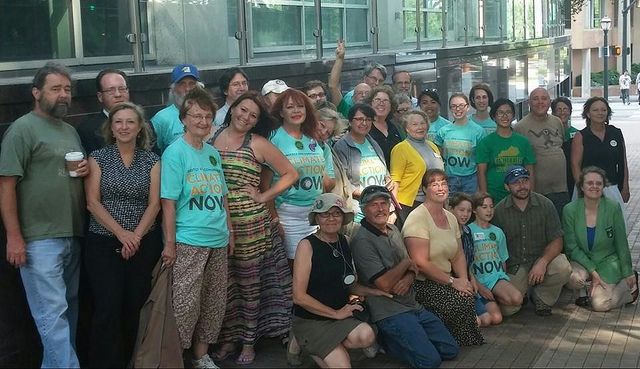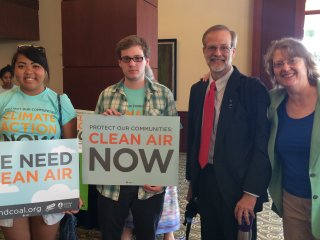Kentuckians to EPA: Act on climate, protect health, support a Just Transition

Kentucky was well represented by grassroots voices at the first hearings held this week by the U.S. Environmental Protection Agency on the agency’s proposed Clean Power Plan to reduce carbon pollution from existing power plants.
Forty citizens from Owensboro, Bowling Green, Louisville, Lexington, Morehead, Berea, Burnside, Inez, Hazard and Whitesburg made the long drive from Kentucky to Atlanta, Georgia on July 28-29 to urge the EPA to strengthen the draft power plant rules. In addition, a KFTC member from Harlan County spoke at the EPA hearing in Denver, Colorado, along with allies from other Central Appalachian states.
“Our state, our nation, and our world desperately need your help to reduce our carbon emissions and save us from the worst effects of climate change. (This rule) is extremely important in preserving the health and economy of our region,” KFTC member Mary Love told the EPA panel. “I am involved with grassroots organizations in Kentucky and Appalachia that are working to protect our air, water, land and the health of our people. We are also working for a just economic transition for our region as we move away from the coal mono-economy.”
Retired nurse Joanne Hill highlighted the health benefits of the EPA’s climate proposal in her testimony. “I believe that clean air and water is a human right. As the EPA works to address the problem of climate change, you have the opportunity to improve health conditions for communities like mine that live in the shadows of highly polluting power plants. I urge you to make this Clean Power Rule much stronger to protect our health and climate.”
Former KFTC chairperson Teri Blanton described ways the Clean Power Plan could jumpstart a clean energy economy in Kentucky. “Today good people are coming together in Harlan County and all across Central Appalachia to build a brighter future. Our people have been producing energy for this nation for over 100 years. We are proud of our heritage. But there is no reason we should stay stuck in time as the world changes. Why shouldn’t we seize this moment to create jobs in wind, solar, and hydropower? We can put our communities back to work by making our homes energy efficient and installing small-scale renewables. That’s true energy independence.”
Rick Fowler, a Sierra Club member from Owensboro, echoed that view. “We must move away from coal and begin a new economy using clean renewable fuels.” Fowler also described how his views were shaped by growing up in a coal-producing community. “My father was a coal miner, a union coal miner. He was sick from black lung, he later died from it, so I did all the chores around the house. And I was taught to believe that we should clean up after ourselves.”

Twelve-year-old Daniel Mullins spoke strongly in favor of the proposed climate protection rule. “If we want Appalachia to be a safe place to live, we need to start being smarter as a nation about how we use energy. We need to live more sustainably, using less energy and developing more ways to create clean energy. We kids need this Clean Power Plan. We need to limit carbon emissions that are warming the whole planet, and to protect the places like our home from being polluted and destroyed.”
His nine-year-old sister, Alexandria Mullins, also gave strong personal testimony. “The Clean Power Plan sounds like a good idea because we do need to use our energy wisely. I want people to know where their energy really comes from, because the mountains in Appalachia are being destroyed just for the coal. It’s not just about coal, though. Natural gas is also being pulled out by wells, and some are even causing people’s wells to become toxic and catch on fire. Where are we supposed to get our water from? That’s my question to you.”

Tim Darst of Kentucky Interfaith Power and Light delivered a petition signed by hundreds of faith leaders from Kentucky in support of strong actions by the EPA to address climate change. “We have a moral obligation to protect our children and future generations from the impacts of climate change by addressing the single largest source of carbon pollution in our country: power plants. Drawing on the strength and ingenuity of American innovation, the EPA’s Clean Power Plan helps drive investment in energy efficiency and clean energy that will power the 21st century.”
Nearly all Kentucky speakers emphasized the health benefits of the plan and urged the EPA to make the rule much stronger to better protect the health of frontline communities living near places where coal is mined and burned.
“The Clean Power Plan does not do enough to address concentrations of localized pollution,” said Lane Boldman of the Kentucky Environmental Foundation. “We would like to see stronger incentives to protect low-income communities, who can be disproportionately affected by carbon pollution.”
“The rate of people having seizures is abnormally high in my community, as are brain and lung cancer rates,” said Joanne Hill. “It breaks my heart to think of how many people I know who live within five miles of the Cooper Power Plant and who are suffering or dead from cancer and seizures. According to the Clean Air Task Force, air pollution from this plant is linked with 35 premature deaths, 52 heart attacks, and 560 asthma attacks annually.”

Attica Scott, a councilwoman representing District 1 in Louisville, described similar concerns for her neighbors and constituents. “I am deeply concerned about the health of my community. District 1 has nineteen chemical plants along what is most commonly referred to as the Rubbertown Corridor. District 1 is also where the Louisville Gas and Electric Company’s Cane Run Road coal-fired power plant is located. On a nearly weekly basis, I receive emails, videos, phone calls, Facebook messages, and meet personally with people who are suffering every day from the fly ash that comes off of the coal ash mountain on Cane Run Road.”
Scott continued, “As an elected official, I am committed to the economic prosperity and success of our communities and our state. In other states, clean energy has proven to be an economic success story. I want that story to include a chapter on Kentucky.”
Many Kentucky speakers pushed for the EPA to significantly strengthen the climate rules before finalizing them in June 2015. They called on the agency to make the health of frontline communities a top priority; invest in a just transition for coal workers and communities; not allow utilities to get credit for switching from burning coal to burning natural gas, garbage or forests; raise the bar and ask Kentucky to meet a higher target for overall carbon emissions; require Kentucky utilities to significantly ramp up their investments in energy efficiency and renewables; and fully enforce the rule despite political and coal industry opposition.
Steve Wilkins of Berea stressed, “I join many others here in saying that your plan is not bold enough. Kentucky and the nation can do even more. Any revisions to the Clean Power Plan should be done to create an even more robust carbon reduction goal. The costs of doing less are far too great for Kentuckians, Americans and all our relations across the world.”
Nina McCoy of Inez described her impatience with decades of inaction on climate change. A high school biology teacher, McCoy held up vintage t-shirts from school environmental clubs she has sponsored over the years. “My students from that 2000 Environmental Club who went to Frankfort are waiting for you to take a stand. The students from my 1990 Environmental Club are waiting for you to take a stand. The whole world is waiting for the United States Environmental Protection Agency to take a stand.”
“The EPA rule ignores your own science about the harmful pollution caused by switching to other fuels,” warned Joanne Hill. “If this rule drives Kentucky to shift from burning coal to burning gas, garbage and forests, you will have achieved nothing.” Other speakers agreed, telling the EPA that its plan to give utilities credit for switching from coal to gas or biomass was like “changing deck chairs on the Titanic.”
“EPA, please promulgate the strongest regulations we need to kick-start addressing the reality of climate change in Kentucky,” said Alice Howell, a Sierra Club member from Lexington. “Rather than pandering to the demands of the energy industry and the whining of the southeastern states about over-stepping your regulatory boundaries, center your Clean Power Plan on the well-being of the planet and its inhabitants.”

Speaking at the EPA hearing in Denver, KFTC member and retired mine inspector Stanley Sturgill told the EPA, "The rule does not do nearly enough to protect the health of the frontline communities. We're dying, literally dying, for you to help us."
“The last point I want to make is one I’ve learned in more than 3 decades of working for environmental justice in Kentucky,” said Teri Blanton at the Atlanta hearing. “The EPA must show up from the very first day with the courage and commitment to fully enforce this rule. You will face obstruction, delay and what I call systematic and intentional incompetence from our lawmakers and agencies. That’s unacceptable.”
Blanton concluded, “Our communities and the planet don’t have 40 years to mess around. For the sake of my grandchildren, and all of our children and grandchildren, the EPA has got to get this one right. We have all got to get this one right.”
The Kentucky delegation to the EPA hearing in Atlanta included members of many allied organizations, including KFTC, the Cumberland Chapter of Sierra Club, Kentucky Interfaith Power and Light, Kentucky Jobs with Justice and Kentucky Environmental Foundation.
KFTC’s analysis of the EPA Clean Power Plan and its impact on Kentucky can be found here. This document includes information about how you can submit comments to the EPA, along with suggested talking points. Public comments will be accepted by the EPA through October 16, 2014.
Recent News
Kentucky’s past legislative session showed alarming trend toward government secrecy
Churchill Downs takes more than it gives. That's why the Kentucky Derby is a no-go for me
‘We must never forget.’ Kentucky town installs markers for lynching victims.
Featured Posts
Protecting the Earth
TJC Rolling Out The Vote Tour – a KFTC Reflection Essay
KFTC Voter Empowerment Contractor Reflection Essay
Archives
- Home
- |
- Sitemap
- |
- Get Involved
- |
- Privacy Policy
- |
- Press
- |
- About
- |
- Bill Tracker
- |
- Contact
- |
- Links
- |
- RSS

